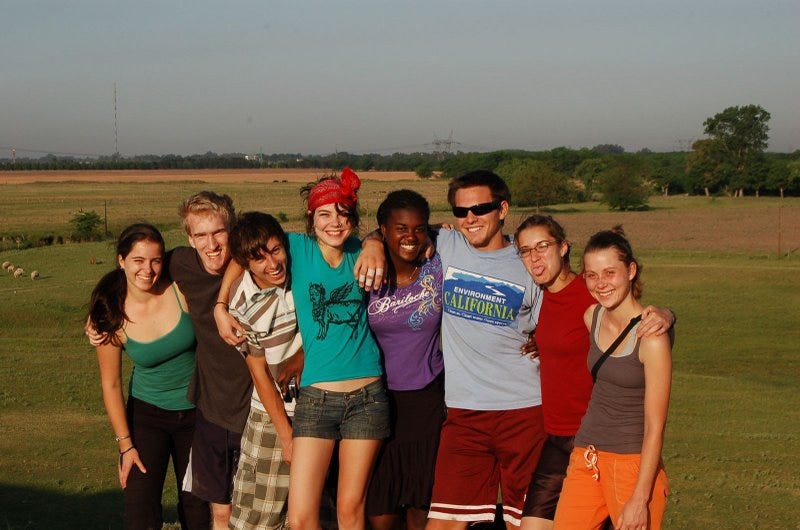Happiness is the Feeling That Power Increases
on the secret sauce of Unschool Adventures
I snap a photo of the Buenos Aires taxi before it drives away with three teenage girls inside.
The girls are participants on my Unschool Adventures trips to Buenos Aires, and they’ve discovered a strange, religious-themed amusement park that they want to visit. Their plan seems sound, so I help them order a taxi, make sure they have a charged cell phone, and wave goodbye as they beeline across the city.
For 15 years, I’ve run adventure programs for teens. These aren’t wilderness expeditions, like NOLS or Outward Bound trips. We’re not river-rafting, bungee jumping, climbing mountains, or otherwise seeking an adrenaline rush.
Nor do I offer historical tours, cultural tours, or straight-up language immersion programs. Running traditional “educational” programs would probably bore me, and I have no desire to compete with the many companies that do this well already.
Rather, my approach has been this: Bring a group of teens to a foreign land, ensure they are housed, fed, and emotionally supported—and then have them to figure out everything else for themselves.
It’s an approach rooted in unschooling, Sudbury schooling, and other philosophies that emphasize freedom and responsibility for young people—and one tempered by my experience at wilderness camps where physical safety and risk management are paramount. Unschool Adventures trips seek ways to let teens explore, push their boundaries, and build independence—without anyone going home injured, traumatized, or dead.
Benign neglect is the phrase I’ve long used, half-jokingly, to describe our approach. The “neglect” is only real when seen through the lens of intensive parenting. The “benign” part is real because the teens know that, behind our “push you from the nest so you’ll learn to fly” approach, there are genuinely caring adult trip leaders.
We trip leaders lead emotional check-ins, every day. We provide a platform for the teens to express their needs, concerns, and suggestions for shaping the trip, every day. We purposefully orient them to each new location, suggest activities, offer tools, set limits, and do many other forms of “scaffolding.”
What we don’t do is tell the teens what to do with their free time. Nor do we rescue them from their own boredom, sloth, or disorganization. In essence we say, with as much gentleness and compassion as we can muster: You’re 14 to 19 years old. You’re capable. Get your shit together. Go make something happen.
Occasionally the teens don’t take full advantage of their freedoms they’re provided. They lie around in people-piles for hours. They watch videos on their devices in the middle of a sunny day. They head to a comfortable cafe and spend all day there.
Sometimes I view these seemingly lazy moments through a positive lens: They’re fulfilling their need for bonding, connection, and unadulterated solo time. Other times I feel like they’re squandering genuinely rare opportunities—and I tell them as much.
Pretty much every Unschool Adventures teen does eventually get off their ass and does something cool, fully unprompted and of their own volition. By hook or crook, they realize that they are in a foreign land that’s littered with possibility, that they possess genuine control over their time, and that they enjoy the support of their adult authority figures. All that’s needed is motivated individual or small group to say screw it, here’s the plan, let’s go!, which then accretes a larger group, and inspires the more reluctant group members to initiate their own screw it! moments.
This is when the real adventures begin. It’s when I feel I’m providing the most value to these teens (and their parents who footed the bill). And it’s when I most clearly witness the kind of elation that Friedrich Nietzsche once described:
“Happiness is the feeling that power increases — that resistance is being overcome.”
“Power” in this regard doesn’t mean power over others—it means competency. It’s about the power to venture into a foreign land (even if just a few blocks) and not get lost (or, not for very long). It’s about forming and achieving a goal, recruiting others to your cause, and learning to lead (or follow) in a little, self-organized unit while navigating language barriers, public transport, and economic exchanges.
To a 15-year-old who has only traveled with her parents before—or never traveled internationally before—these are life-changing moments. Spread enough of them over a 6-week trip, and you have a potentially life-shaping experience.



Love this! I am so hopeful that when my now 12 year olds are 14-19 year olds, that at some point I will be able to convince them to join you on one of these adventures. The lines, "You’re 14 to 19 years old. You’re capable. Get your shit together. Go make something happen." speak to my soul. Though I suppose they could be said of any age over 14 really. :)